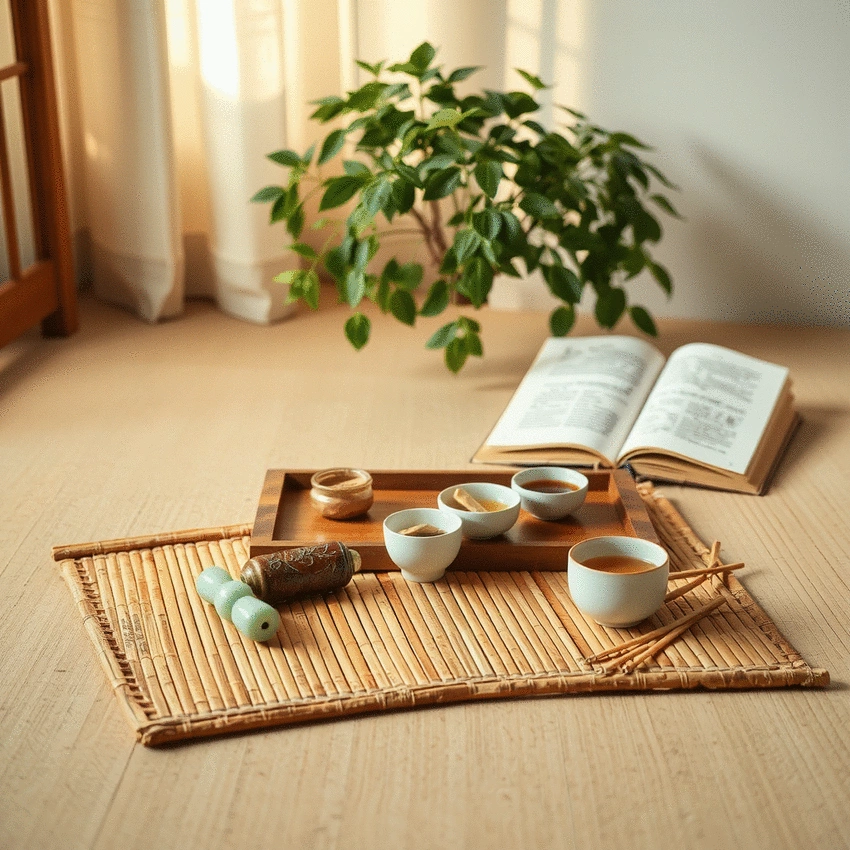Balancing Qi Through Seasonal Practices
By Kiran Wu / Feb 28
As we navigate the complexities of life, understanding the flow of energy within us can transform our approach to health and wellness. How well do you know the essence of life that courses through your body? Embracing the principles of Traditional Chinese Medicine (TCM) can offer profound insights into enhancing your overall well-being.
This visual illustrates the connection between qi, meridians, and the five elements, emphasizing the importance of harmony for overall well-being.
Qi is the essence of life that flows through our bodies. A harmonious flow of qi leads to optimal physical and mental health.
Meridians are channels through which qi travels, impacting physical and emotional health. Clear pathways are essential for energy balance.
Each element (wood, fire, earth, metal, water) corresponds with specific qualities and organs, impacting qi flow and balance.
A balanced life, aligned with the five elements, supports qi flow and overall health, enabling personal growth and harmony.
Energy flow is a central concept in Traditional Chinese Medicine (TCM), essential to understanding how our bodies function. At The Meridian Connection, we believe that nurturing this flow is key to achieving holistic wellness. Just like a flowing river nourishes the land around it, the smooth movement of energy, or qi, is vital for our health and balance.
So, what exactly is qi? It’s often described as the life force that circulates through our bodies, connecting our physical, emotional, and spiritual aspects. Imagine qi as the gentle breeze that moves through trees, vitalizing them and allowing them to thrive. By recognizing how qi operates within us, we can begin to appreciate its vital role in maintaining our overall well-being. For a deeper dive into how this vital energy operates, explore our article on energy flow in Traditional Chinese Medicine.
In TCM, qi is the essence of life that flows through our bodies and supports all physiological functions. When our qi is abundant and flowing freely, we tend to feel healthy and energetic. However, when there are blockages or imbalances, we might experience fatigue, illness, or emotional distress. Think of qi as the electricity powering a city; without it, everything falls into darkness.
Meridians serve as the channels through which qi travels. You can think of them as highways that allow energy to flow to various parts of the body. At The Meridian Connection, we emphasize the importance of these pathways in our daily practices. When meridians are clear and open, our bodies can function at their best, promoting health and vitality.
There are twelve primary meridians, each linked to specific organs, such as the heart, liver, and lungs. When considering the pathways, it's vital to understand how they interact with one another. If one pathway becomes congested, it can affect others, leading to a domino effect of energy imbalance. For more information on how these vital pathways influence health, consider reading about understanding acupuncture and meridians.
In TCM, the Five Elements Theory – wood, fire, earth, metal, and water – plays a crucial role in understanding qi and the natural rhythms of life. Each element corresponds with specific qualities and organs, creating a harmonious balance when in sync. By recognizing how these elements interact with our qi, we can better identify the roots of imbalances in our bodies.
For example, wood is associated with growth and expansion, while water represents adaptability and flow. When we align our lifestyle with these elements, we can support our energy flow effectively. Here’s how each element connects with our well-being:
Understanding these principles enables us to create a balanced life, fostering the smooth flow of qi and enhancing our overall health. At The Meridian Connection, I’m passionate about guiding you through this journey of discovery, empowering you to take control of your own energy flow.
Did you know? Regularly practicing Qigong not only enhances your energy flow but also strengthens your immune system. Just 15 minutes a day can significantly reduce stress levels and improve overall vitality. Make it a daily ritual, and you'll notice a remarkable boost in your physical and mental well-being!
Finding balance in our daily lives can feel overwhelming, but integrating Qigong and meditation into your routine can create a sanctuary of calm and clarity. These practices are not just ancient traditions; they are accessible tools that can enhance your well-being. As someone who embraces the principles of Traditional Chinese Medicine (TCM) at The Meridian Connection, I encourage you to experiment with these techniques and discover what resonates with you!
The beauty of Qigong lies in its simplicity. Just a few minutes each day can help align your energy flow. Combining gentle movements with breath awareness fosters a deep connection to your body and qi. Consider setting aside time in the morning or evening to engage in these practices, allowing them to rejuvenate your spirit and ground you in the present moment.
To seamlessly incorporate Qigong and meditation into your daily life, follow these simple steps:
By gradually increasing your practice time, you'll likely find greater ease in connecting with your energy. Remember, it's about progress, not perfection!
In addition to Qigong, small lifestyle changes can significantly impact your energy balance. Here are some adjustments to consider:
These adjustments may seem small, but they can pave the way for a more balanced and energized life. Reflect on which changes resonate with you and start incorporating them today! For further insights into maintaining balance, explore information on balancing qi for better health.
Breathwork is a powerful tool for harmonizing energy and emotional release. Techniques that focus on deep, rhythmic breathing can help clear emotional blockages and promote relaxation. Here are some effective breathwork practices you can try:
Incorporating these breathwork techniques into your daily routine can facilitate emotional release and provide a sense of calm. The connection between breath and emotional well-being is profound, and by embracing these practices, you’ll foster a more harmonious energy flow. Learn more about how meridians and acupuncture treatment outcomes are related.
Here is a quick recap of the important points discussed in the article:

 Balancing Qi Through Seasonal Practices
As the seasons change, so do our bodies and minds. The ancient wisdom of Traditional Chinese Medicin
Balancing Qi Through Seasonal Practices
As the seasons change, so do our bodies and minds. The ancient wisdom of Traditional Chinese Medicin
 Meridians and Chronic Pain Explained
Have you ever considered how ancient wisdom can illuminate modern health challenges? The fascinating
Meridians and Chronic Pain Explained
Have you ever considered how ancient wisdom can illuminate modern health challenges? The fascinating
 Meridian Blockages and Health Effects
Have you ever considered how the flow of energy within your body can impact your overall well-being?
Meridian Blockages and Health Effects
Have you ever considered how the flow of energy within your body can impact your overall well-being?